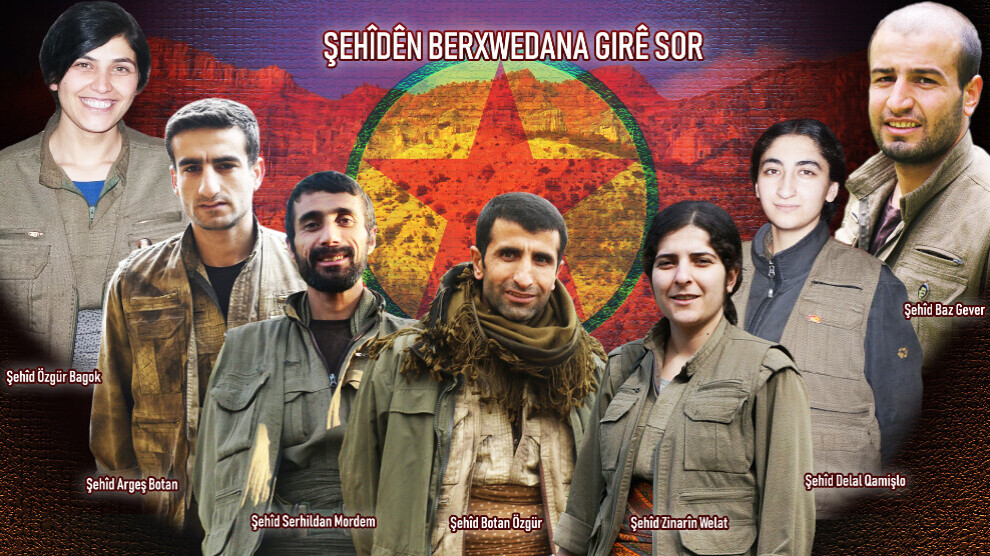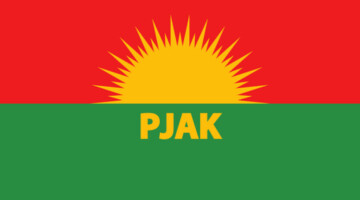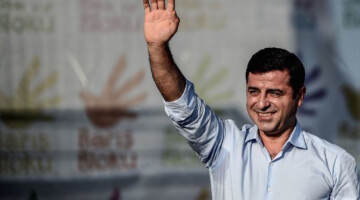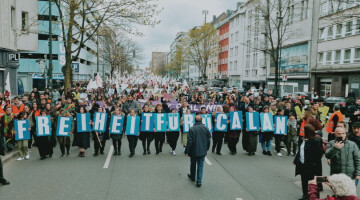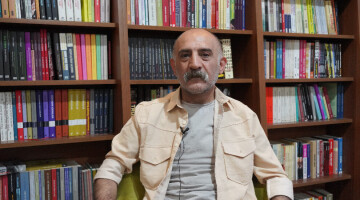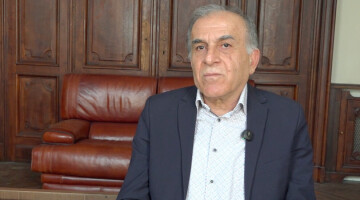Until 3 September, the Turkish army kept carrying out its routine attacks. They have tried in every imaginable way to end us. There was no scent, no smoke, explosion, and gunfire that we had not been engulfed in during the war. These magnificent Zagros tunnels, created with effort and sometimes bloodshed by hundreds of guerrillas since 2014, stood like a fortress against the enemy, shielding them. For more than two months, Turkish state forces had been rendered impotent by nine guerrillas. Whatever the case, the victory belonged to the guerillas. This was announced at the time of Baz's martyrdom.
The 80-day Girê Sor resistance was assembled from the stories of resistance participants Mizgîn Dalaho, Armanc Sîmko, and Têkoşîn Devrim.
Part V is as follows:
UNMATCHED ATTACK
It was predicted that the Turkish army could do something that day, possibly using explosives or poisons. Everyone has been warned about this. Six of them were on the second floor, while three were on the first floor. After dinner, about 6 p.m., there was a very powerful shake that no one could explain; even those downstairs were shaken. The interesting part is that there was no explosion sound and merely a sudden shock. Then, before I knew what was going on, a greyish-white smoke began to fill the passageways. The smell was disgusting; it was a foul odor that no one could stand, similar to rotten eggs. Normally, when they exploded on the middle floor, there was no smoke or smell coming downstairs because the distance was too much. This time the smoke came all the way down. Therefore, it was understood that this attack was a different attack unlike any other.
NO ANSWER FROM ABOVE
Armanc and Têkoşîn hid their faces behind their hands and went to inspect the general door. Armanc collapsed after only 5-6 meters. Têkoşîn, too, collapsed to the floor after making a small advance. Têkoşîn was choking and her skin was getting purple all the time. She couldn't breathe; it was as if she was taking her final breath. Mizgîn slapped her and gave her artificial respiration, and when she began to feel better, she brought her milk that had been kept against poisoning. Têkoşîn couldn't drink since she bit her tongue. Mizgîn drew her to the manga as she began to regain her composure. She also began vomiting.
Armanc was said to have died as a martyr. Mizgîn arrived at her at 9:00 p.m.; her skin was normal, but she was unconscious. She checked her pulse and found that she was still alive. She had no recollection of what had happened. Mizgîn also brought her to the squad. She'd misplaced her shoes and lost her memory. She was asking bizarre questions and repeating the same ones dozens of times.
They were called via radio, but no one responded. Têkoşîn still fainted on occasion, but she was not permitted to sleep. Mizgîn followed Armanc upstairs at 21:00 when she didn't return. The barricades in front of the blasted Çarçella gate flew up to the squad's front. However, there was around a 150-meter gap between them. Even the heaviest supplies for the middle-floor barricades were damaged. Despite the 200-meter distance between the kitchen and the door, it was evident that the pressure was so intense that the kitchen utensils were almost flung out.
SERHILDAN AND BOTAN LIED SIDE BY SIDE
Serhildan's body was found first after venturing a little further down the tunnel. Serhildan and Botan were killed next to one other in the passageway, near the munitions store. Botan was lying on his back, his body scarlet, his eyes open. Zinarîn's body was discovered near the squad after passing through the kitchen. Their throats were very red. I went to the manga, where Argêş, Delal, and Özgür had also fallen. She had her hands on her throat and her eyes were wide. Her legs were pointing outward. Argeş had a gas mask in his hand, but he didn't have time to place it on his face. All three were in the same place. It was assumed that they fell as martyrs in a very short period of time as a result of the gas's effect. There were no words to describe the emotions and feelings felt after seeing the bodies, as well as the wrath and hatred that nearly exploded their hearts.
MIZGİN SAID THAT SHE COULD NOT STAY IN THE CAVE ANY LONGER
Armanc had lost her memory and had become emotionally distraught. She was sobbing over the bodies. She was knocked down. Têkoşîn and Armanc were both in poor health. They had no recollection of anything. Even though she had seen the bodies, Armanc would question where they were every five minutes. Mizgîn stated that they would no longer be able to stay in the cave like that. What Mizgîn indicated was the wisest decision to make, but the climate of the time prohibited a logical and suitable decision from being made after the martyrdom. It was difficult to persuade her to go. At around 23.00, we left the bodies, but there was still hesitation at 03.00. Armanc alternated between saying "Yes" and "How are we going to leave the martyrs behind us? We can't abandon the cave." Everything she said was being repeated hundreds of times. It was also known they had to leave it there. Finally, after so much effort, she was persuaded. Even though it was a difficult decision to make, even if it was merely to tell what had occurred in those tunnels, they would have to leave there...
IF DETECTED, THEY WOULD DETONATE THEIR BOMBS
Mizgîn and Armanc headed upstairs once more. In any case, there was no food and no bread. Things including sugar and tahini, as well as a radio, password, organizational records, and thermal materials, were prepared. Because there was moonlight, it was important that they leave as soon as possible. They were not under the influence of the chemical gas, and they were moving very slowly. Armanc was already half unconscious, and Mizgîn had the upper hand. Everyone had bombs in their pockets, and they were warned that if they fell on them, the bombs would detonate. Têkoşîn and Armanc got into an argument in front of the door just as Mizgîn came out. As they were descending, there was a sound from the stones slipping beneath their feet, and Turkish state forces began to shoot. When they rolled meters down the cliffs, their backpacks and both of their guns landed on the cliffs. Armanc was shot in both arms. Armanc's wound had healed, but she had lost a lot of blood. Drones and reconnaissance aircraft flew over for around 40 minutes. The Turkish army was continually requesting surrender. Then the scout and drone took off, and as things quieted down, they threw themselves into the woods and took off. A week later, they met other guerrillas by traveling to Stûne.
MARTYRED AS A YJA STAR COMMANDER
In the Girê Sor resistance there were 5 female guerrillas. Women were the main element that determined life and war in this country as well. The same was true in Mamresho, Aris Faris, and all other fields. Zinarîn, Özgür, and Delal all excelled in their parts in Girê Sor. It is vital to understand what conditions they can withstand.
The team's commander was Zinarîn. She was a person who swiftly obtained organizational maturity since she had spent a long time with the old cadres and had entered the settings with this maturity. She had not been in conflict; when she arrived in Avaşîn in 2018, she gathered experience. Despite her age, Zinarîn never concealed the fact that she lacked experience and always stated that she needed to get it. She was always very modest. She was always eager to learn, no matter how much she knew or how much experience she had. As a result, anybody who went to the action was escorted. Her focus on combat and military service, as well as her drive to grow, were great. Her organizational attitude, dedication to her teammates, and discussions were always sources of strength for her. It was said that if Heval Zinarîn was among us, comradeship would never be broken. She was sincere, easygoing, and disciplined all at the same time. If something bad happens, they should be able to say, "She resisted as a YJA Star Commander and fell as a martyr." She felt the burden of the process and was conscious of the organization's confidence. She took life and war very seriously. Living in modesty was her guiding concept, and she never wavered from it. She was martyred as a pioneering YJA Star Commander who left her mark on the resistance.
SHE WAS AWARE OF THE ORGANIZATION'S EXPECTATIONS.
Özgür became a member in 2015. She also remained in Heftanîn's attack. She arrived in the Avaşîn area after receiving sabotage training. She also continued to participate in the attack on Süleyman Tepesi. She was one of the most important figures in Girê Sor. She had prior experience and knowledge in the field, as well as knowledge of war tunnels. She was dedicated and practical. A person trusted Özgür and could fight beside her in every field, whether on the battlefield or in the tunnels. She never let anyone down, and she always had an opinion about the war. She wasn't officially in charge, but she was aware of the organization's expectations. She was also a key figure in Heftanîn's land battles. He was thinking about the conflict and was highly interested in it. She was a saboteur, yet she never shied away from contributing to the resistance effort. She was not terrified of coming into contact with the enemy. She was not tired of the conditions, and she was also ideologically competent. She wrote about the martyrs, and she was especially close to the Heftanîn martyrs. She was severely injured in a recent explosion which burned the majority of her face. It seemed as if she was healing her wounds and re-creating herself every instant. Just like a person resurrected from her ashes... She joined the war by giving meaning to the physical, intellectual, and spiritual pains she was experiencing, gaining spirituality and becoming more beautiful with each meaning she offered. She never escaped from life. Özgür was constantly photographing and filming her friends with her camera. "All of this is history," she added, "and we need to convey the photos of these times to the organization." She became one of the most stunning faces that would live on forever in those pictures...
DELAL WAS THE YOUNGEST OF GIRE SOR
Delal was the latest participant as well as the youngest in age. She was from Qamishlo and joined in 2019. She arrived in Basya after the new shirvans. Delal was well-known among the Basian forces for her maturity, self-sacrifice, and modesty. These three characteristics were embodied in her. People are sometimes ashamed of themselves when they see the effort she has made, despite her early age. Girê Sor was close to the enemy, so you'd like to acquire some experience there.
Delal discussed all of her challenges and inconsistencies. But she was eager. She was quiet and reserved. Despite her inexperience, her maturity and organizational stance often astounded others. She inherited these characteristics from her family. She got easily trained in the organisation. When they teased her, "After you get out of here, the organization will appoint you to command the unit," she would respond, "I don't need to be a commander; I'm already a militant of this party." She responded to all surrender calls with gunfire. At this age, she valiantly died after a battle with the Apoist spirit.
ARGÊŞ USED TO SAY WE WILL WRITE AN EPIC
Argêş arrived in Avaşîn after spending time in other places. She was very attached to women, with whom she shared all of her problems. In Avaşîn, she stayed with women for a while. She placed a high emphasis on women. "A soldier must die in this Martyr Têkoşîn stance," she said. She was very insistent on getting out to shoot. I'm not going anywhere; we're going to write an epic here," she used to say. Her heart was pure, and she had no bad thoughts. She grasped everything immediately because she knew how to listen.
THREE GUERILLAS MANAGED TO EXIT FROM GIRÊ SOR
Three guerrillas managed to escape from the Girê Sor battle tunnels. Their stories were used to create this five-part narration. Finally, we will end with their common statement: "We have shared all of life's joys and sorrows with these friends; we have supported one other in all of our trials and tribulations, and we have given each other hope. We recognize that we have been insufficient in explaining them. This is what causes us pain. We now understand that our weight is greater. Keeping them alive and relaying their stories." It was our job and duty to tell this... It was a great chance for all of us to be a part of such a resistance and to live with those people. Perhaps it was very different to fight in the same position as Kurdistan's most self-sacrificing children, the most ardent revolutionaries, and to live under those conditions. We desired to learn about the conditions in which they resisted and how the enemy attacked. This was their legacy. We shall always carry their flags high. We shall build on the values they established. We shall persevere in this spirit of resistance, and we will surely win!"

